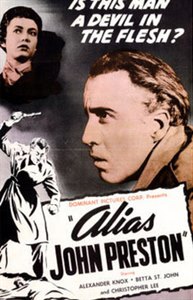Critical reception
The Monthly Film Bulletin wrote: "This static and stagey melodrama is unimaginatively handled, finishing with a trick ending which explains remarkably little. Alexander Knox, as the psychiatrist, brings some degree of plausibility to the proceedings, but the playing generally is characterless." [5]
Kine Weekly wrote: "Its players do their best to bring conviction to the mumbo jumbo, but the task is beyond them. Although it opens promisingly, the play borders on the ludicrous as its climax approaches ...The picture creates interest at the start, but the subsequent flashbacks, which introduce foreign characters, are crude and rob the overall of realism and point. Alexander Knox maintains a professional bearing fo the bifter end as Walton, but the others are out of their depth as soon as the tale goes schizophrenic. [6]
Picture Show wrote: "Christopher Lee gives an excellent performance." [7]
The Daily Film Renter wrote: "A beautifully studied performance by Christopher Lee as the perspiring, nightmare-haunted psychotic distinguishes this feature from the average. Scripting is competent, and the gimmick of showing half-real dreams on the screen will keep audiences interested." [8]
In The British 'B' Film Chibnall and McFarlane wrote: "It was a pretty botched job, over-played and under-plotted." [9]
Leslie Halliwell said: "Watchable second feature." [10]
In British Sound Films: The Studio Years 1928–1959 David Quinlan rated the film as "poor", writing: "Dreary, turgid drama: seems much longer than it is." [11]
TV Guide called the film "a poorly developed psychological drama." [12]
Allmovie described it as "an average psychological mystery worth watching for the good performances." [13]
In Offbeat: British Cinema's Curiosities, Obscurities and Forgotten Items, Jennifer Wallis wrote: "The Danzingers' high speed production accounts for the short running time. ...In the context of such whistle-stop production, Alias John Preston is an impressive feat, and in no way a bad film per se. Its tightly compacted plot and self-conscious intensity, though, tire the viewer before becoming somewhat infuriating in their transparency." [14]
This page is based on this
Wikipedia article Text is available under the
CC BY-SA 4.0 license; additional terms may apply.
Images, videos and audio are available under their respective licenses.
